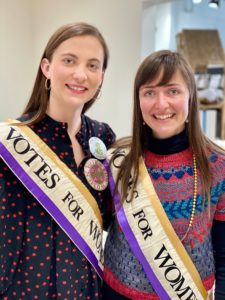They championed cooperation and female friendship. They put care for the community at the heart of their campaigns. They made “women’s issues” human issues, and didn’t back down.
These platforms paid off big for the three women elected to town and county government in 2021. Voters chose Hailey Morton Levinson as their mayor with overwhelming enthusiasm. Similarly, Chair of the Teton County Board of County Commissioners Natalia Macker was re-elected by a wide margin. And Jessica Sell Chambers will take a seat on the town council with solid support from voters.
While these wins are a boost for women’s representation, the fact remains that the town and county’s highest governing bodies are dominated by men. In 2021, women will hold three out of the 10 combined seats on the town council and the board of county commissioners. However, the percentage of women in office locally is slightly higher than national numbers. According to the Center for American Women and Politics current election analysis (not all races have been called), in 2021 women will be at least 25.1 percent of the U.S. House, up from 23.2 percent, and 24 percent of the U.S. Senate, down from 26 percent.
Wyoming Women’s Action Network founder Jen Simon says female elected officials face a double standard. “Women are often seen as or praised for a collaborative or cooperative or sensitive leadership style,” she said. “They are still being branded with what are traditionally seen—and often denigrated—as feminine characteristics.”
So far, Levinson, Macker, and Chambers have shown that their leadership style resonates with voters. But as a minority in town and county government, they are tasked with being the voice of all women. Will the pressure to be that voice become a burden?
When Women Lead
Macker was almost speechless Saturday morning when she heard the news that former Vice President Joe Biden had won the presidential election. That’s a rare thing for the exuberant and well-spoken community figure. A thespian and seasoned leader, she is not often at a loss for words.
“Saying I’m elated doesn’t quite do it justice,” she said. Macker is a Democrat, and, unlike town councilors, she’s not required to be nonpartisan.
Part of her elation was the cumulation of a week of good news for Macker. She won re-election with 26.7 percent of total votes, the most of any commission candidate. She also saw her friend and colleague Levinson win by a landslide, garnering 61 percent of the vote. Together, they’ve teamed up on a childcare baseline inventory, assessing the town and county’s childcare needs. They have also spoken out in unison in support of sexual assault survivors.

Voters overwhelmingly chose Natalia Duncan Macker (left) and Hailey Morton Levinson for county commission and mayor, respectively. (Courtesy Natalia Duncan Macker)
A champion for women in politics, Macker was not only thrilled about local race results. She was also pleased that Sen. Kamala Harris would be the first woman and first woman of color vice president.
“She is speaking,” Macker said of Harris, quoting a moment in Harris’s debate against Vice President Mike Pence. “We want to hear her speak.”
Macker yearns to hear women leaders speak because she knows that, when women are in charge, positive things can happen. The Centre for Economic Policy Research and the World Economic Forum released a report in August analyzing why countries led by women had responded better to the coronavirus pandemic.
Supriya Garikipati, a developmental economist at Liverpool University and co-author of the report said in an interview with The Guardian, “Our results clearly indicate that women leaders reacted more quickly and decisively in the face of potential fatalities.”
Garikipati said the study showed that female leaders were risk averse when it came to saving lives, and more willing to take risks with the economy.
Countries the world over struggle with these dueling factors—spread of disease vs. a functioning economy. The analysis of women leaders suggests that they had exhibited more empathy and decisive communication than their male counterparts.
Levinson says empathy resonates with voters. “I think people want to have leaders who are whole people, caring for their families, caring for individual people and thereby caring for the whole community,” she said.
Levinson also says these are qualities that all leaders should exhibit, not just women. She’s become the de facto voice for having robust childcare options in the valley. As the mother of two, it’s an issue she knows intimately. Her colleagues at the town and county often turn to her as the expert on childcare.
“It’s cool to have that sort of trust from your other electeds,” she said. “But then at the same time, it’s something that everyone should care about. Even if you don’t have young kids, it will affect you if your employee can’t come to work because they don’t have childcare.”
Levinson doubts childcare would come up as a factor in council discussions if she wasn’t there. And this would lead to poor decision-making not just in human services issues, but also in more traditional council issues like building approvals. Using her lens, she can make sure sidewalks are planned that accommodate parents. “I know what it’s like to walk down the sidewalk with my stroller and my dog,” she said.
Compassion Shouldn’t Be Gendered
Of course, gender norms have changed in the past several decades, and plenty of men push strollers around town. Why that lived experience hasn’t translated into more awareness in policymaking may have to do with old ways of doing things, Macker said.
“Our government was founded by quote unquote ‘fathers,’” Macker said. “The government’s role historically hasn’t included some of that caring work because it wasn’t in the sphere of experience of the people operating the government.”
Men have catch-up to do, Macker says. As a woman, she knows what it’s like to not have her experiences represented. Now, she wants to do the work to make sure perspectives long missing from Jackson government are heard, including people of color, immigrants, and parents of young children.
Jessica Sell Chambers refutes the idea that caring about the whole community is a sign of softness.

Jessica Sell Chambers, Jackson Town Councilor-elect, says compassion in government shouldn’t be tied to female leaders. (Courtesy Jessica Sell Chambers)
“I don’t think it’s in any way, shape, or form a weakness or a feminine quality,” she said. “It’s not feminine. It’s more the ability to recognize the lived experiences of people other than white men.”
Chambers said she is looking forward to addressing issues that disproportionately affect women. Like Macker and Levinson, Chambers lists childcare, early childhood education, and sexual harassment as topics to tackle while in office.
“The three of us recognized that, to have a strong community, you have to have strong people,” Chambers said. “You only have strong people and families when everybody has enough and has the ability to make ends meet.”
Levinson likes to imagine what it would be like if the town council had continued its storied beginning. Jackson elected an all-women town council in 1920. Levinson wonders what it would have been like to have 100 years of all-women leadership.
“What sort of issues would have been addressed?” she asked. “It would have been different.”
According to Jen Simon, the way to get more women in office is to get more women to run for office. Too often, this is painted as an individual responsibility or failing on behalf of women, she says.
“We say things like ‘women have to be asked more’ or ‘women don’t feel as confident running.’ But that overlooks that this is a systemic issue.”
Simon says research shows that the majority of PAC and donor dollars, nationally, go to incumbents who are disproportionately white and male. That was true in Wyoming in this election cycle as well.
“Party gatekeepers are more likely to encourage men than women to run,” Simon said.
When they do run, women are as likely to win as men. Jackson proved this last week with women beating out men significantly across the board. First-time town council candidate Devon Viehman was the only female candidate not to win her race, but she says she hasn’t ruled out running again.
Charting A Path Forward
Despite being the sole female representatives on the town council and county commission, Levinson, Chambers, and Macker don’t feel lonely. They each find strength in female camaraderie.
Celebrating her win election night, Levinson was further buoyed by a text she received from a fellow mom. The text said the woman’s daughter was excited to learn that Levinson had won. The daughter, a first grader, had accompanied her mom to vote. “She got to fill in the bubbles for really strong women,” the text read.
“That makes it all worth it,” Levinson said.
Chambers says she will be leaning on female friends to keep her strong and focused while in office. She and Viehman formed a close bond during the race, even though they were ostensibly opponents–they belong to different political parties. This unusual friendship is something Chambers will rely on long after the election.
“I told Devon that I need her to hold me accountable and make sure I’m staying true to the principles I ran on,” Chambers said.
Macker says her sense of female solidarity comes in part from national figures like the late Supreme Court Justice Ruth Bader Ginsburg. More immediately, Macker found inspiration in something Sen. Harris told a Texas crowd in October.
“Yes, sister, sometimes we may be the only one that looks like us walking in that room,” Harris reportedly told a largely Black audience in Fort Worth. “But the thing we all know is we never walk in those rooms alone — we are all in that room together.”
Someday, Jackson’s town and county rooms may be filled with as many or more women than men. In the meantime, Macker, Levinson, and Chambers hope to pave the way for more female leaders.






